Chapter 4
Sharing Our Sporting Traditions
Friendships forged over golf and cricket
Australians and Malaysians have always come together over sport. The game of golf, in particular, has long featured in the diplomatic and business worlds, and this was especially the case throughout the 1950s and 1960s. Several of Malaysia's most senior ministers, including Prime Minister Tunku Abdul Rahman, had a passion for golf, and enjoyed using the agreeable atmosphere of the golf course to discuss ideas and issues.41 Secretary of the Malaysian Foreign Ministry, Tan Sri Haji Mohammed Ghazali Shafie was also a keen golfer and, indicative of the diplomatic informality of the 1960s, would comfortably partner a relatively junior Australian diplomat at Royal Selangor. Australia's diplomats in Malaysia happily adjusted to this style of diplomacy and, indeed, High Commissioner Critchley's last days in Kuala Lumpur in 1965 were said to have been marked by two days of golf with Malaysian colleagues and friends.42
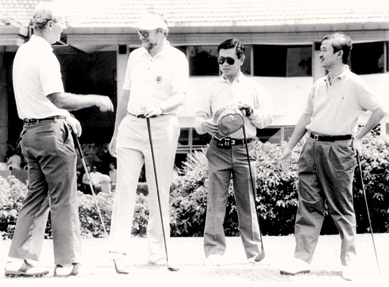
Although cricket did not attach itself to Malaysia to the extent that it did elsewhere in the Commonwealth, for a brief time it was a shared pleasure that cemented Australian and Malaysian friendships. In the early 1970s, young diplomats from India, Sri Lanka, Britain, New Zealand and Australia formed teams that played against teams put together by the Malaysian Police, the Planters' Association and the Malaysian Army. There was such enthusiasm for the cricket round robin that the Sultan of Selangor offered to host the first match at his palace and provided a banquet for the players after the game.43 Diplomatic and corporate games of golf are now more likely to be played than cricket, but many Malaysians remain passionate about the sport and the Malaysian National Cricket Team has competed at international level since 1967.
My Story
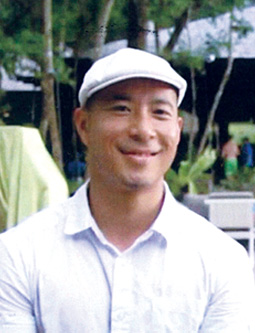
Associate Director National Australia Bank, Australia-ASEAN Council Board Member
I was never meant to be in Australia. My parents left for Australia in 1975 as budding young medical students, intending to do their internship for a few years and then head back to Malaysia. The decision to come to Australia was largely driven by an Australian English teacher named Rachel who taught in my mum's kampong. One of the things she taught was a song about an Australian farm, which was catchy enough to make my mum wish to live on a farm.
When the opportunity to further their studies in Australia came up, mum seized the chance to fulfil her dream of living on a farm. They bought 10 acres in McLaren Vale, South Australia, although being a kampung girl, mum had no idea about farming. When the only animals they were successful at breeding were snakes, mum decided to pack it in and balik kampung— return to the village. Unfortunately for her, my dad had fallen in love with Australia and decided to stay.
Reluctantly, mum had my two sisters and me in Australia but she was adamant we retain our connection with Malaysia. One way of achieving this was to give us two names to reflect our mixed Malay and Chinese heritage. Our mixed background gave us insights into Malaysian society. My mum grew up in a small Malay kampung called Air Barok near Malacca and my dad grew up in Kajang in a hardworking Chinese Methodist family. They met just after the 1969 riots and although the socio-political climate suggested that there would be some Romeo- Juliet type drama, their marriage was largely uneventful. The fact that they were different races was spectacularly irrelevant.
To a large extent, this epitomises my experiences of Malaysians. Despite very different cultures and perspectives, a prevailing boleh-lah – can do – attitude seems to rise above their differences. I always look to my family as a microcosm of what's going on in Malaysian society. Seeing how they interact, despite being of different faiths, languages and cultures gives me great hope for the future.
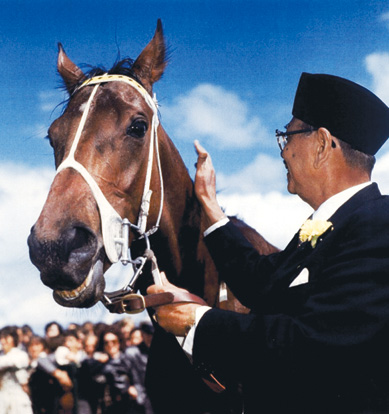
The Melbourne Cup: The race that stops a nation
For many Australians and Malaysians, horseracing, and the Melbourne Cup in particular, hold a special place in our sporting story. In 1955, as our formal trade and diplomatic relations began to develop, Australia exported a modest 12 race horses to Malaya.44 Sixty years later this market has grown considerably with1395 thoroughbred horses imported between 2003 and 2013. Increased interest in the sport may well have arisen following Tunku Abdul Rahman's attendance at the Melbourne Cup, during his 1959 official visit to Australia, where he thoroughly enjoyed the 'carnival atmosphere and the sporting and social importance of horseracing Down Under'.45 Today, Malaysia's most famous racing enthusiast must be businessman Dato' Tan Chin Nam, the only Asian to have won the Melbourne Cup—four times. Teaming up with renowned Australian trainer Bart Cummings,
Dato' Tan won his first Cup in 1974 with 'Think Big'. Remarkably, he repeated his success with the same horse, by then jointly owned by the Tunku, the following year. Dato' Tan fondly recalls the Tunku being completely overwhelmed when accepting the Cup.46 Dato' Tan went on to win his third Melbourne Cup in 1996 with 'Saintly' and his fourth in 2008 with 'Viewed'. In a lasting tribute to our horseracing links, in 1995, Tunku Shahabuddin and Peter Lawrence established the Melbourne Racing Club Trophy run each year at Selangor Turf Club's International Racing Carnival.
Expats take to the sporting fields
As well as sharing passions for golf and horseracing, Australian expats in Malaysia naturally gravitate towards, and are keen to share, their own sporting codes away from home. In February 1957, the first game of Australian Rules football, between teams from RAAF No. 10 Bomber Squadron and 2nd battalion, Royal Australian Army Regiment, was played before a crowd of around 1000 in Kuala Lumpur.47 It was not until the 1980s that Australian expats formed their own AFL (Australian Football League) team, the 'Malaysian Warriors', who now compete around the region as part of AFL Asia. AFL Asia has also introduced its junior Auskick program which is open to all children in Malaysia aged 5 to 12. For Australian AFL fans, and curious Malaysians, 'Aussie rules' can also be seen on Australia Plus Television's Sports Lounge which broadcasts AFL games into Malaysia.
Rugby Union also has a loyal following in Malaysia, which is the birthplace of what has become the world's premier rugby 10s annual tournament, the COBRA 10s. The first COBRA—Combined Old Boys' Rugby Association— match was held in Kuala Lumpur in 1967 and was played among local teams and expats. Australian Army servicemen while stationed in Malaysia soon became involved and other Australian teams have been a part of the COBRA 10s competition from the early 1970s. Since the COBRA 10s became a fully international tournament in 1992, it has grown to include 16 international teams. The honours have been shared among New Zealand, Samoa, the United Kingdom, South Africa, and Fiji, as well as Malaysia and Australia— with Malaysian teams currently ahead of the Australians. Hockey is also widely played in Australia and Malaysia. In 2015 Malaysia's national hockey team was in Perth for practice games against the Australian men's team, the Kookaburras, and both countries play in the Sultan Azlan Shah Cup.48
Malaysians are accomplished athletes and expats and students in Australia are also well organised around their favourite sports away from home. Each year they take to the athletics fields for the Malaysian Games, which are a precursor to the Malaysian Students Council of Australia's annual National Conference and Games. Others are especially active in netball and badminton—the sport that has brought Malaysia much international success. One of Malaysia's best known badminton champions, Ong Beng Teong, gold medallist at the 1982 Commonwealth Games in Brisbane, is now a resident of Melbourne. After retiring, Ong trained to be a coach with the Badminton Association of Malaysia and, after coaching students in Selangor for many years, he established the Pro Badminton Academy (PBA). PBA has now expanded with academies in Malaysia and Australia, where the courts are fully booked from the moment the doors open each day.49
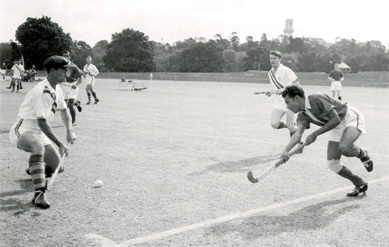
The AMI continued to play a special role in nurturing Australia's sporting ties with Malaysia between 2005 and 2015 supporting cycling, hockey, swimming, netball, and surf lifesaving activities. Joint training initiatives between Netball Australia and the Malaysian Netball Association provide mentoring and coaching programs for athletes, and education in sports psychology, nutrition and sports medicine. Surf Life Saving Australia also worked with the AMI and, in 2012–13, collaborated with the Life Saving Society of Malaysia on techniques for drowning prevention as well as coaching. A highlight for the Australia–Malaysia sporting relationship was the choice of Kuala Lumpur as the venue for the Australian swimming team to complete its final training programs in preparation for the 2008 Beijing Olympics.
Sharing our love of sport has become a natural fit for Australians and Malaysians and, as with the arts, a spirit of enthusiasm and mutual curiosity has provided the impetus for an expanding range of pursuits. With so many Malaysians and Australians crossing paths as tourists and migrants, or in galleries, cinemas and at sports venues, the possibilities for future collaboration are limitless.
My Story
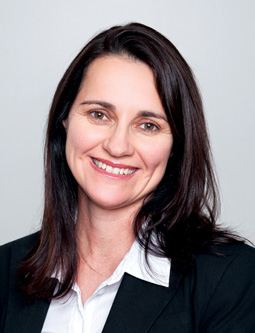
Former Captain of Australia's Women's Hockey Team and Former Australia–Malaysia Insitute Board Member
This year not only celebrates 60 years of Australia–Malaysia diplomacy, but also the tenth anniversary of the Australia–Malaysia Institute (AMI), funded by the Australian Government, and supported by the Department of Foreign Affairs and Trade (DFAT). I am pleased to have had the opportunity to be an AMI Advisory Board Member for the past six years.
The AMI was established in 2005 with the aim of strengthening people-to-people and institutional links and to develop and deepen mutual understanding between the two countries.
A part of my role on the AMI Board was to assist with identifying programs which could add real benefit to the development of relations between Malaysia and Australia. With a history in sport, having represented the Australian Women's Hockey Team for 15 years and represented Australia at the Commonwealth Games in Kuala Lumpur in 1998, this was a perfect fit for me. I was able to offer advice on developing sports programs, which could be mutually beneficial to both countries.
In 2010-11 the AMI funded three elite sports coaching scholarship programs, selecting three Malaysian coaches—from hockey, swimming and cycling—to spend time in Australia developing their skills in an elite training environment. These programs proved successful and assisted in establishing relationships between the Australian and Malaysian National Associations to continue further development in the coaching area.
Another important initiative was the Jom Pi Jaring Netball Program, modelled on the successful Australian, "Net, Set, Go!" program. Netball Australia sent coaches to Malaysia to assist in developing the skills required to enable Malaysian Netball to establish 11 pilot programs in schools to develop the netball skills of children aged between 5 and 8.
This was a wonderful opportunity to use some of the knowledge I had gathered during the Commonwealth Games in Malaysia in 1998, which guided me in determining what sports program might be beneficial to both our countries. My experiences in Kuala Lumpur have been extremely rewarding from a sporting perspective, but have also given me insights into an extraordinary range of cultural activities and showcased the immense beauty of such a wonderful country.
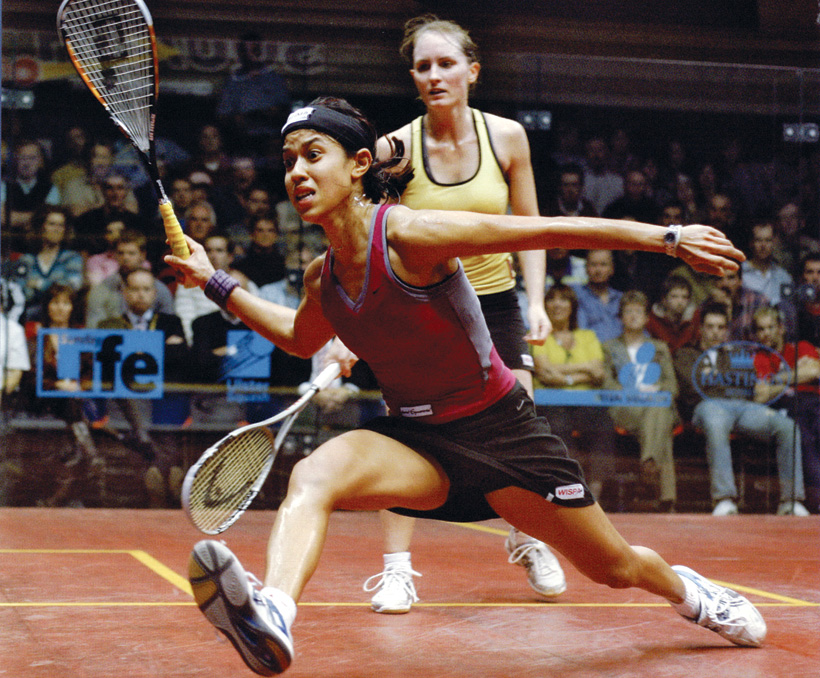
Australian Natalie Grinham plays Malaysian Datuk Nicol David at the 2006 Women's Squash Championship.
My Story
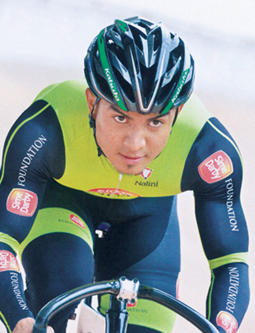
Malaysian Track Cyclist
I came to Australia in late 2007 after stepping up into the National Sports Council of Malaysia's elite cycling program. This was an opportunity I had been waiting for since I was in the junior development squad. Moving from Malaysia to Australia was a really big decision in my life as I had to leave my hometown, family and friends, and my culture. However, I really wanted to become a professional cyclist and an Olympic Champion, so I had to leave my comfort zone and made this wise decision.
My career has progressed tremendously since I started training with my Aussie coach, John Beasley. He has taught me every single training component I need to become a world class track cyclist. I'm also working with some other great local people, such as my strength and conditioning coach, Martyn Girvan, and my psychologist, Dave Williams. Their experience and knowledge has driven my career forward.
The opportunity to train in Australia has given me a lot of valuable experiences. Australia is, indeed, the best place to train and gain sports knowledge, particularly in cycling. I feel so lucky to be based in Melbourne as I can sometimes join training sessions with the Victorian Institute of Sport. They have treated me like a local and we have exchanged a lot of ideas, experiences and even culture. The Malaysian track cycling team also participates in local races around Australia, along with top Australian cyclists, and this really helps me learn more about racing craft and takes my performance to the next level.
I believe my years in Australia have afforded me a very intimate view that I can share with my fellow Malaysians. I still remember one competition, when there were no Malaysian supporters present, but I could hear Australians were cheering for me. This illustrates the warmth of the connection between Australia and Malaysia and I really feel that Australia is now my second home.